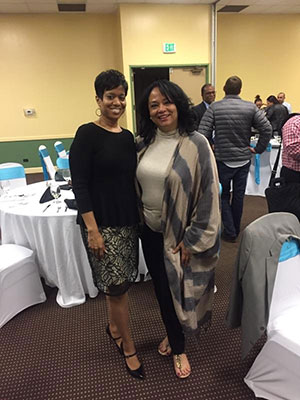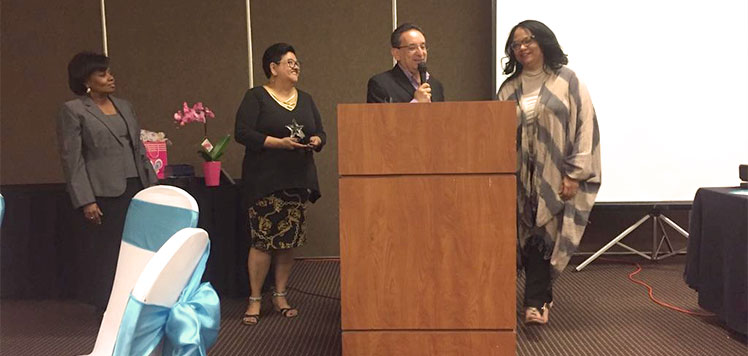This week, we speak with Angelle Fouther, a long-time volunteer on the board of Montbello Organizing Committee (MOC). Angelle currently chairs the retail and economic development task team of MOC. She also works as the director of communications for LiveWell Colorado. She shared her passion for weaving strong community through dialog, development and action.
1. Tell us about you and the Montbello Organizing Committee (MOC), and the social change you are trying to achieve.
“I got involved with MOC along with a group of eight other residents and stakeholders at the group’s beginning (about four years ago). The organizing committee was catalyzed by investigatory funding through LiveWell Colorado and The Denver Foundation to explore the potential for moving Montbello toward community organizing. We determined that Montbello was ready for community organizing. Starting out, we slowly developed our identity and explored funding opportunities for the first and second year. None of us were community organizers, so I’m glad we took that time to get our feet under us initially. Our first leadership council began working to engage the community in late 2014, asking: What issues need to be addressed in the Montbello neighborhood? We got lots of answers, but we also asked about what assets the community had. After several community meetings, we gauged the priorities, and the top three that emerged were: transportation, retail and economic development, and community beautification/enhancement. We then started to address those issues by developing task teams for each, putting plans in motion and engaging community members to get involved. For instance, we recognized there was no good infrastructure for communications in the neighborhood; we have since developed a community newspaper through MOC, and we created a presence on online platforms (social media, Facebook, Twitter, online newspaper) to communicate activities, events, stories and so forth. That’s a necessity for a strong community. As we build capacity, we’re looking to expand our work, but we realize we have to take a little on at a time if we are going to be successful.”
2. What keeps you inspired and going when things get tough?
“Often we set a high bar for what ‘success’ means. What I’ve tried to do with the groups engaged with MOC is create lower benchmarks along the way that we are able to celebrate. It’s essential to celebrate small successes and be thankful for the mistakes because they’re opportunities to learn. Also, there’s joy and learning in working together with community. Volunteer work is special—it’s not mandatory, you’re not getting paid, so there’s a unique sort of bond that emerges when you join forces with neighbors to make the neighborhood a better place. Lots of our folks have no free time but they make the time, because they have a heart for community and for improving the quality of life of others. So, that’s what keeps me going—seeing good people that care and want to make things better. It may not look like change and success all at once, but being around that energy consistently is encouraging.”
 3. What advice would you give to someone who is trying to break new ground in a traditional field?
3. What advice would you give to someone who is trying to break new ground in a traditional field?
“Learn from those that have done it before. Our first year, MOC just learned, we inquired, we discussed with other community organizers and we reflected. Because you don’t have to recreate the wheel. You stand to gain a lot from learning from successes in the community—find mentors, find people willing to share their stories and listen and learn. Book education will only get you so far—why not take advantage of the embodied knowledge around you?”
4. What book do you recommend to everyone you meet and why?
“I’ve been incredibly moved by the books of Malcolm Gladwell. They offer a unique perspective. … I’m torn between several, but I’d have to say the book Outliers stands out. It’s about taking a look at what creates excellence, what’s the environment for success, and how different it is than what we tend to believe. That’s a book I encourage people to read to step back and examine their assumptions about what causes success, and maybe readjust and write their own narrative.”
5. How have you worked with Joining Vision and Action (JVA), and how has that helped your organization?
“We worked with JVA last year to complete a market scan for Montbello on the topic of retail development, particularly our food desert status and attracting a full service grocery store. Our aim was to assess our assets and demand for attracting a grocery store. Together we did a full scan and marketing piece that summarizes the scan which we have been using in the community and in meetings with Mayor Hancock, entrepreneurs and developers to dialog about this. We were able to dispel some stereotypes about developing in our community because we had facts, statistics and anecdotes that provided a different narrative.”
6. What else would you want to share with us that we haven’t asked?
“Having been involved now for a few years in community organizing has really changed my perspective on so many things. I recognize that if you’re not involving community voices then you’re not involving the majority of people who are most impacted by the issues—whether it be commerce, education, policies, health care, etc. Being involved in this has shown me that it’s the “common person” that is often left out of decision-making regarding so much of what takes place in our municipalities, our state and even our country. Yet their perspectives are invaluable, really. Learning how to gain that perspective is key to our success moving forward. I’ve been thankful to learn this lesson and to grow in my ability to engage community.”







Leave A Comment